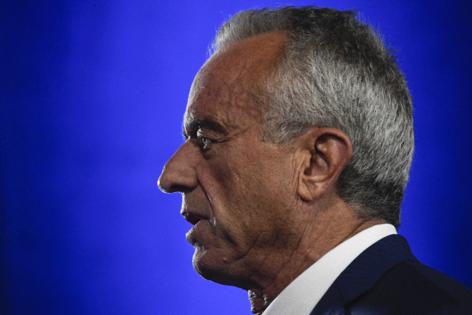Tyler Cowen: RFK Jr. would put the economy at risk, too
Published in Op Eds
President-elect Donald Trump’s announcement of Robert F. Kennedy Jr. as his choice to be secretary of Health and Human Services has provoked a lot of objections, many of them explaining how he would be a danger to both scientific progress and public health. But too little has been said about the economic damage he could do as leader of one of the most significant branches of the administrative state.
Spending on health care constitutes more than 17% of the U.S. economy. The HHS secretary oversees reimbursement rates for Medicare, which accounts for about 14% of the entire federal budget. How much a hospital or doctor receives for a medical procedure depends on what the HHS decides. That in turn shapes the incentives in the health-care system — whether a hospital can afford to offer a given procedure, for instance, or which procedures would most increase hospital profits.
Whoever becomes HHS secretary will have to seriously reconsider these reimbursement rates, as the U.S. government faces significant fiscal problems and too much U.S. health care is too expensive. Authority over Medicaid reimbursement rates is more complicated, due to the role of the states in that program, but the HHS still is closely involved.
One of the problems with an RFK Jr. ascendancy is that his core views, which run strongly against vaccines and pharmaceuticals, make it unlikely that any of these reimbursement revisions will be done in a rational or scientific way. The best evidence indicates that pharmaceuticals are a relatively cost-effective ways of saving lives, and conversely that many costly surgical procedures are not very effective. One of the main drawbacks of the U.S. health-care system is often described as overtreatment, yet some vaccines and drugs — the Covid vaccines, GLP-1 medications and HIV-AIDS treatments, to name just a few — are yielding very high returns.
The danger is that, with RFK Jr. at HHS, the U.S. would restrain health-care spending in exactly the wrong areas. The human costs of such a mistake are obvious, but from a more narrow fiscal perspective, a sicker America would lead to even more serious budgetary problems.
In any case, for all the recent talk and speculation about DOGE, the HHS secretary could well have more of an impact on the federal budget, for better or worse.
HHS also oversees liability protection for vaccines. Most approved routine vaccines have had liability protection for almost 40 years, which makes it much easier to bring them to market. In the absence of such protection, vaccine manufacturers would be plagued by many more lawsuits, often trivial ones. Another scenario is that a vaccine with a strongly positive social value but side effects for some users could be pushed off the market.
The judiciary is not the ideal place to resolve such scientific disputes. In today’s contentious political environment, it is easy to imagine a court awarding substantial damages to a mother with an autistic child, even though no serious evidence links autism and vaccines.
As it turns out, the HHS secretary has influence over this issue, including through public forums. The secretary does not have the power to unilaterally remove liability protections for vaccines, but a leadership campaign to eliminate or weaken these protections could damage vaccine distribution and development. More broadly, such a development could harm the U.S. role as the world leader in biomedical innovation and commercialization. Again, in addition to their human cost, such policies could damage the U.S. economy and U.S. exports.
While the Food and Drug Administration is semi-autonomous, it also falls under the purview of HHS — and the FDA could be another lever for the HHS secretary to use against vaccines. Sadly, even some long-established vaccines with a highly positive expected social value, such as for measles, are falling in popularity.
RFK Jr. also has strong views about food. He prefers it to be organic, and condemns more industrial means of production, which he associates with obesity and other maladies. The S&P 1500 Packaged Foods Index fell by almost 3% after Kennedy’s nomination.
I am far from convinced by Kennedy’s views. But there is a modest chance he could generate publicity that would lead to a paring back of agribusiness subsidies, which virtually all economists would support. That is perhaps the greatest potential economic upside to his appointment.
HHS secretaries have not generally been major public figures, as they tend to be administrators rather than policy innovators. That may be about to change. So it’s crucial for all Americans, especially those in the U.S. Senate, to recognize how much power this position holds — not only over human lives and childhood development, but also over the wellsprings of U.S. economic prosperity.
____
This column does not necessarily reflect the opinion of the editorial board or Bloomberg LP and its owners.
Tyler Cowen is a Bloomberg Opinion columnist, a professor of economics at George Mason University and host of the Marginal Revolution blog.
©2024 Bloomberg L.P. Visit bloomberg.com/opinion. Distributed by Tribune Content Agency, LLC.




























































Comments